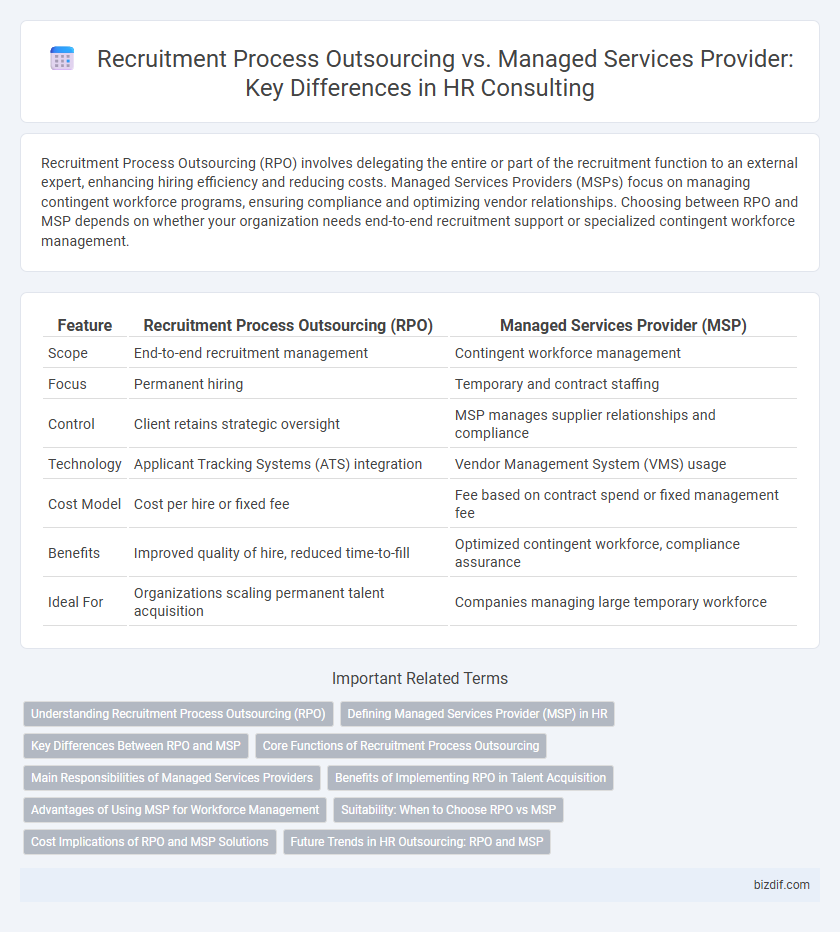Recruitment Process Outsourcing (RPO) involves delegating the entire or part of the recruitment function to an external expert, enhancing hiring efficiency and reducing costs. Managed Services Providers (MSPs) focus on managing contingent workforce programs, ensuring compliance and optimizing vendor relationships. Choosing between RPO and MSP depends on whether your organization needs end-to-end recruitment support or specialized contingent workforce management.
Table of Comparison
| Feature | Recruitment Process Outsourcing (RPO) | Managed Services Provider (MSP) |
|---|---|---|
| Scope | End-to-end recruitment management | Contingent workforce management |
| Focus | Permanent hiring | Temporary and contract staffing |
| Control | Client retains strategic oversight | MSP manages supplier relationships and compliance |
| Technology | Applicant Tracking Systems (ATS) integration | Vendor Management System (VMS) usage |
| Cost Model | Cost per hire or fixed fee | Fee based on contract spend or fixed management fee |
| Benefits | Improved quality of hire, reduced time-to-fill | Optimized contingent workforce, compliance assurance |
| Ideal For | Organizations scaling permanent talent acquisition | Companies managing large temporary workforce |
Understanding Recruitment Process Outsourcing (RPO)
Recruitment Process Outsourcing (RPO) involves transferring all or part of recruitment functions to an external provider specializing in talent acquisition, enhancing scalability and efficiency. RPO providers leverage advanced technology, market expertise, and data analytics to optimize candidate sourcing, screening, and onboarding processes. This approach reduces hiring costs, shortens time-to-fill metrics, and improves workforce quality compared to traditional recruitment methods.
Defining Managed Services Provider (MSP) in HR
A Managed Services Provider (MSP) in HR specializes in outsourcing the management and optimization of contingent workforce programs, including vendor management, compliance, and workforce analytics. MSPs deliver end-to-end workforce solutions by partnering with organizations to ensure cost-efficiency, scalability, and risk mitigation in temporary and contract staffing. Their expertise encompasses supply chain coordination, performance monitoring, and strategic workforce planning to enhance contingent labor productivity.
Key Differences Between RPO and MSP
Recruitment Process Outsourcing (RPO) focuses on managing the entire recruitment lifecycle, including sourcing, screening, and onboarding candidates, while Managed Services Providers (MSP) primarily handle contingent workforce management and vendor management systems. RPO delivers end-to-end talent acquisition solutions tailored to permanent hiring needs, whereas MSP optimizes temporary staffing and manages multiple staffing vendors to ensure cost control and compliance. The key differences lie in service scope, workforce type managed, and strategic alignment with organizational talent needs.
Core Functions of Recruitment Process Outsourcing
Recruitment Process Outsourcing (RPO) focuses on end-to-end recruitment functions including candidate sourcing, screening, interviewing, and onboarding, effectively managing the entire hiring lifecycle. RPO providers leverage advanced technologies and data analytics to enhance talent acquisition efficiency and reduce time-to-hire. This core function enables companies to scale recruitment efforts while maintaining compliance and improving candidate quality compared to the typically more transactional support offered by Managed Services Providers (MSPs).
Main Responsibilities of Managed Services Providers
Managed Services Providers (MSPs) in HR consulting primarily oversee the entire contingent workforce program, including supplier management, compliance, and strategic workforce planning. They ensure seamless coordination between staffing vendors and the client organization, optimizing cost-efficiency and quality of talent acquisition. MSPs also provide detailed analytics and reporting to drive continuous improvement in workforce management.
Benefits of Implementing RPO in Talent Acquisition
Implementing Recruitment Process Outsourcing (RPO) streamlines talent acquisition by leveraging specialized expertise and scalable resources that improve candidate quality and reduce time-to-hire. RPO providers deliver enhanced data analytics and recruitment technology, enabling better workforce planning and cost efficiency compared to traditional Managed Services Provider models. Organizations benefit from increased flexibility, employer branding support, and compliance management, driving sustainable talent pipeline development and improved recruitment outcomes.
Advantages of Using MSP for Workforce Management
Managed Services Providers (MSPs) offer streamlined workforce management by delivering scalable recruitment solutions tailored to fluctuating business needs, ensuring cost efficiency and reduced time-to-hire. MSPs provide enhanced visibility and control over contingent labor through centralized oversight, leading to improved compliance and risk mitigation. Leveraging advanced technology, MSPs optimize talent acquisition strategies and performance analytics, driving higher quality hires and workforce productivity.
Suitability: When to Choose RPO vs MSP
Recruitment Process Outsourcing (RPO) is suitable for companies seeking end-to-end talent acquisition solutions with scalable recruitment capabilities and a focus on employer branding. Managed Services Provider (MSP) is ideal for organizations aiming to optimize contingent workforce management, improve vendor oversight, and control labor costs across multiple staffing suppliers. Choosing between RPO and MSP depends on whether the primary need is permanent hiring or contingent workforce management.
Cost Implications of RPO and MSP Solutions
Recruitment Process Outsourcing (RPO) typically offers cost savings through scalable staffing models and reduced recruitment overhead, making it ideal for organizations with fluctuating hiring needs. Managed Services Providers (MSPs) often involve higher upfront investments but provide comprehensive workforce management solutions that can lead to long-term cost efficiency by optimizing contingent labor spend. Evaluating the total cost of ownership, including vendor management, technology integration, and compliance, is essential when deciding between RPO and MSP services for talent acquisition strategies.
Future Trends in HR Outsourcing: RPO and MSP
Future trends in HR outsourcing emphasize the integration of artificial intelligence and data analytics within Recruitment Process Outsourcing (RPO) and Managed Services Provider (MSP) models to enhance talent acquisition efficiency. Increasing demand for flexible, scalable workforce solutions drives the convergence of RPO and MSP services, enabling organizations to streamline contingent and permanent hiring processes. Emphasis on employee experience and employer branding within these outsourcing models supports retention and engagement strategies critical for evolving labor market dynamics.
Recruitment Process Outsourcing vs Managed Services Provider Infographic

 bizdif.com
bizdif.com